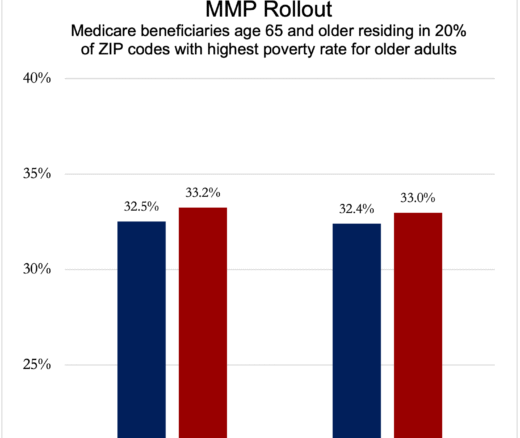
Acupuncture Could Fix America’s Chronic Pain Crisis–So Why Can’t Patients Get It?
A Proven, Low-Risk Treatment Is Backed by Major Studies and Patient Demand, Yet Medicare and Insurers Still Make It Hard To Use
Health Care Access & Coverage | Health Equity
Blog Post
More than one-quarter of the 1.1 million people with HIV in the U.S. are covered by Medicare. Since the 1990s, the number of patients being treated for HIV on Medicare has tripled, making the traditional Medicare program one of the largest insurers of this patient population and the second largest source of federal financing for HIV care. A new, first-of-its-kind study from LDI Fellows shows that many people with HIV require lifesaving, long-term antiretroviral therapy (ART) and experience gaps in treatment.
Adherence to ART is critical to ensuring good health outcomes among people with HIV and, under Medicare, they have guaranteed coverage for most of their HIV-related care. But information is sparse about whether they are adequately adhering to the ARTs they need.
Using national Medicare Part A, B, and D claims data, LDI Senior Fellows Jalpa A. Doshi and Robert Gross and Associate Fellow Dovie L. Watson examined ART utilization patterns among nearly 50,000 Medicare beneficiaries with HIV starting a new anchor ART medication. The study found that suboptimal rates of adherence and wide treatment gaps in ART use are common among people with HIV on Medicare.
Only half (about 53%) of people with HIV achieved optimal adherence (≥95% of days covered by ART medication, a common threshold). Furthermore, more than one in four (about 26%) had treatment gaps of at least 30 days, and 10% were classified as having discontinued their ART treatment given a treatment gap of 90 days or more. Sociodemographic factors, such as younger age, female sex, Black race, higher comorbidity score, mental health conditions, and substance use disorder were associated with lower adherence and higher discontinuation.
While the Medicare data do not contain the reason for ART non-adherence or discontinuation, the investigators speculate that systemic and structural factors, including many social determinants of health [SDOH], are important drivers. For instance, they found an association between poorer ART adherence and Medicare Part D low income subsidy (LIS) status, for which about 82% of people with HIV qualify. This finding might seem counterintuitive given patients receiving the Part D LIS are largely shielded from the high cost-sharing that negatively impacts adherence to ARTs. However, it is likely that low income subsidy eligibility is a surrogate marker for poverty and worse SDOH. This means that people receiving the LIS likely face additional systemic and structural barriers to adherence beyond just out-of-pocket costs. Co-investigator Dovie Watson says, “the findings suggest we should avoid assuming that financial assistance alone is sufficient to ensure people with HIV will consistently take the medications they need: their particular SDOH can have a stronger effect on their ability to access treatment and needs to be addressed too.”
Antiretroviral therapy treatments have revolutionized HIV care, allowing patients to live longer and thus begin aging into Medicare coverage. Co-investigator Jalpa A. Doshi says, “the number of Medicare beneficiaries with HIV is going to grow exponentially in the coming decade.” By 2030, nearly 300,000 people with HIV will reach age 65 and become eligible for Medicare. Therefore, the need for effective HIV care in Medicare is only going to become more critical, heightening the importance of reducing barriers to ART adherence.
Our study identifies several high-risk groups that should be prioritized for targeted interventions by the Centers for Medicare and Medicaid Services (CMS), including patients with mental health conditions and/or substance use disorder, who are less likely to adhere to their HIV medications.
– Jalpa A. Doshi
Policies that prioritize groups that experience a disproportionate burden of systemic and structural barriers to ART adherence and mitigate the barriers they face are urgently needed. According to Co-investigator Robert Gross, “Given the need for continued progress towards our goal of ending the HIV epidemic in the U.S., CMS should prioritize efforts to adapt existing, effective interventions to improve HIV medication adherence in the Medicare program.”
The study, “Antiretroviral Treatment Gaps and Adherence Among People with HIV in the U.S. Medicare Program,” was published on October 27, 2023, in AIDS and Behavior. Authors include Pengxiang Li, Girish Prajapati, Zhi Geng, Vrushabh P. Ladage, Jean Marie Arduino, Dovie L. Watson, Robert Gross, and Jalpa A. Doshi.


A Proven, Low-Risk Treatment Is Backed by Major Studies and Patient Demand, Yet Medicare and Insurers Still Make It Hard To Use

Chart of the Day: Medicare-Medicaid Plans—Created to Streamline Care for Dually Eligible Individuals—Failed to Increase Medicaid Participation in High-Poverty Communities
Research Brief: Shorter Stays in Skilled Nursing Facilities and Less Home Health Didn’t Lead to Worse Outcomes, Pointing to Opportunities for Traditional Medicare

How Threatened Reproductive Rights Pushed More Pennsylvanians Toward Sterilization

Abortion Restrictions Can Backfire, Pushing Families to End Pregnancies

They Reduce Coverage, Not Costs, History Shows. Smarter Incentives Would Encourage the Private Sector